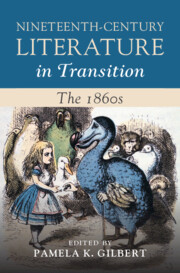Book contents
- Nineteenth-Century Literature in Transition: The 1860s
- Nineteenth-Century Literature in Transition
- Nineteenth-Century Literature in Transition: The 1860s
- Copyright page
- Contents
- Figures
- Contributors
- Introduction
- Chapter 1 Realism and Psychology
- Chapter 2 Sensational Bodies
- Chapter 3 Irish Rebellion on the Sensational Stage
- Chapter 4 Palgrave’s Golden Treasury
- Chapter 5 Impossible Monsters, Rabbit Holes, and New Worlds
- Chapter 6 Periodicals, Popular Fiction, and the Affordances of Digital Collections
- Chapter 7 Publishing in the 1860s
- Chapter 8 Italy in Transition
- Chapter 9 Silent Center, Vocal Margins
- Chapter 10 Empire and Evidence in Armadale and the Morant Bay Rebellion
- Chapter 11 Reading the Nonevental
- Chapter 12 An Age of Mythmaking
- Chapter 13 Reimagining Society
- Chapter 14 Historical Ecologies in Heterodox Economic Thought and Literary Realism of the 1860s
- Chapter 15 Extraction, Exhaustion, and the Sensation Novel of the 1860s
- Chapter 16 Evolution and the Human
- Bibliography
- Index
Chapter 8 - Italy in Transition
Italian Unification and Elizabeth Barrett Browning’s Last Poems (1862)
Published online by Cambridge University Press: 01 February 2024
- Nineteenth-Century Literature in Transition: The 1860s
- Nineteenth-Century Literature in Transition
- Nineteenth-Century Literature in Transition: The 1860s
- Copyright page
- Contents
- Figures
- Contributors
- Introduction
- Chapter 1 Realism and Psychology
- Chapter 2 Sensational Bodies
- Chapter 3 Irish Rebellion on the Sensational Stage
- Chapter 4 Palgrave’s Golden Treasury
- Chapter 5 Impossible Monsters, Rabbit Holes, and New Worlds
- Chapter 6 Periodicals, Popular Fiction, and the Affordances of Digital Collections
- Chapter 7 Publishing in the 1860s
- Chapter 8 Italy in Transition
- Chapter 9 Silent Center, Vocal Margins
- Chapter 10 Empire and Evidence in Armadale and the Morant Bay Rebellion
- Chapter 11 Reading the Nonevental
- Chapter 12 An Age of Mythmaking
- Chapter 13 Reimagining Society
- Chapter 14 Historical Ecologies in Heterodox Economic Thought and Literary Realism of the 1860s
- Chapter 15 Extraction, Exhaustion, and the Sensation Novel of the 1860s
- Chapter 16 Evolution and the Human
- Bibliography
- Index
Summary
The 1860s opened with a new geopolitical prospect for Europe: Italian unification, achieved in 1861. Elizabeth Barrett Browning, outspoken supporter of Italian independence, tracked the period of transition between the 1859 Second War of Independence and the creation of the new nation-state in her final work, collected in Last Poems[GK8] (1862). Though understudied patriotic poems like “The Sword of Castruccio Castracani,” “Garibaldi,” and “The King’s Gift” look forward to celebrate an anticipated national consensus, they also look back, working through public processes of mourning. Celebrating the unification of disparate kingdoms and imperial territories under a constitutional monarchy might have been particularly resonant for the UK as a nineteenth-century nation-state, as British enthusiasm for the Risorgimento suggests; however, attention to Barrett Browning’s transatlantic publication contexts and political-historical content , as the American Civil War began to unfold, reminds readers that civil strife and territorial dissolution remain ever-present undercurrents to nation-state creation.
Keywords
- Type
- Chapter
- Information
- Nineteenth-Century Literature in Transition: The 1860s , pp. 147 - 165Publisher: Cambridge University PressPrint publication year: 2024

